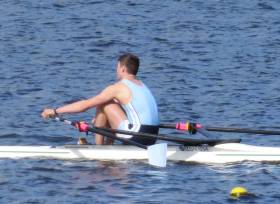Displaying items by tag: Irish Schools' Regatta
Colaiste Iognaid Edged Out by Methody at Irish Schools' Regatta
Great Day for Coláiste Iognáid Rowers at Irish Schools' Regatta
#Rowing: Galway’s Coláiste Iognáid won the prize as the top school at the Irish Schools’ Regatta at O’Brien’s Bridge today. There were 11 hours of competition on a sunny, cool day. St Brigid’s, Killarney, which won the women’s under-23 eight, were second overall – Coláiste Iognáid had won the equivalent men’s race and the Junior 16 men’s eight.
Coleraine Grammar School had a good day. They won the women’s junior 16 eight and Molly Curry won the women’s under-23 single, though she is still a teenager. Jack Dorney, competing for St Francis, was the top men’s under-23 sculler. Tristan Orlic of St Vincent's took the honours at junior 16 level.
Irish Schools’ Regatta, O’Brien’s Bridge, Sunday (Selected Results)
Men
Eight – Under-23: Col Iognáid. Jun 16: Col Iognáid.
Four – Under-23, coxed: CBC, Cork B. Junior 16, coxed: Pres, Cork.
Pair – Under-23: CRCC.
Sculling, Quadruple – U-23: CRCC. Jun 16, coxed: Skibbereen CS.
Double – U-23: St Francis. Jun 16: St Coleman’s.
Single – Under-23: St Francis (J Dorney). U-16: St Vincent’s (T Orlic)
Women
Eight – U-23: St Brigid’s, Killarney. Jun 16: Coleraine GS.
Four – U-23: Regina Mundi. Jun 16, coxed: Coleraine GS.
Pair – U-23: Col Iognáid.
Sculling, Quadruple – U-23: St Brigid’s. Jun 16, coxed: Laurel Hill A.
Double – U-23: St Brigid’s B. Jun 16: St Leo’s.
Single – U-23: Coleraine GS (M Curry) 6:25. Jun 16: Laurel Hill (N Kiely).






























































